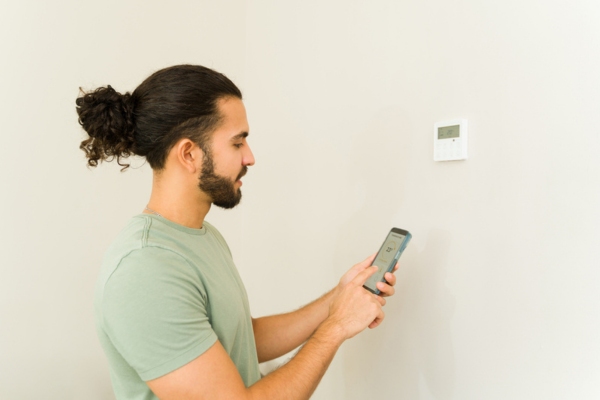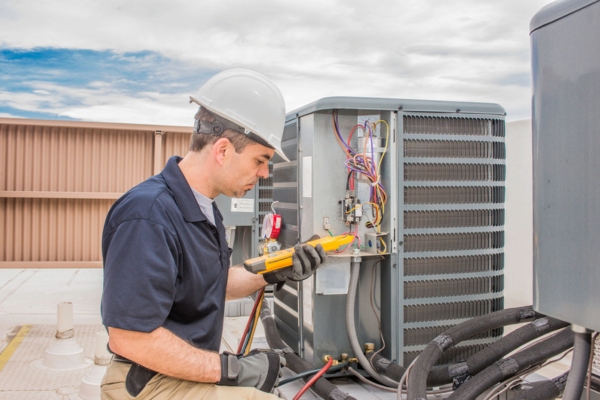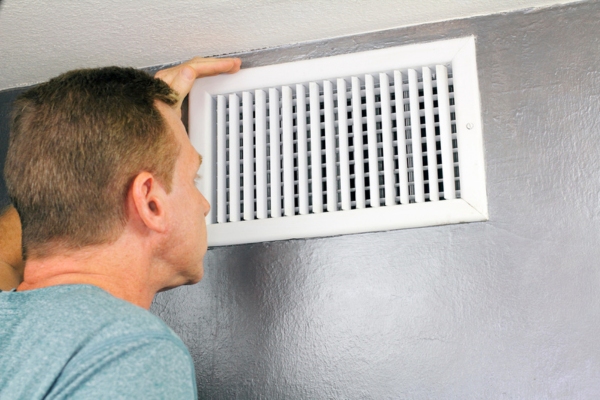Table of Contents
- Why Your Air Conditioner Isn’t Cooling: Leading Issues and Fixes
- 1. Incorrect Thermostat Settings
- 2. Clogged HVAC Air Filters
- 3. Blocked or Dirty Air Conditioner Condenser Coil
- 4. Mechanical Issues in Cooling Systems
- 5. Refrigerant Leak in the AC System
- 6. Leaky HVAC Ducts
- 7. Air Conditioner Evaporator Coil Problems
- 8. Obstructed HVAC Vents
- 9. Improperly Sized Air Conditioner
- 10. Skipping Routine Cooling System Maintenance
- FAQs: When Your AC Unit Isn’t Blowing Cold Air
- How Frequently Should I Have My Cooling System Professionally Serviced?
- What’s the Average Operational Life of a Central Air Conditioning Unit?
- Can Upgrading to a Smart Thermostat Improve Cooling?
- What Should I Check Before Contacting an HVAC Professional?
- What Effect Does Routine Maintenance Have on Energy Costs?
- Final Thoughts
- Contact Lake Region Energy for Premier HVAC Services
When your air conditioner fails during a warm day, indoor comfort can vanish quickly. This frequent issue often signals a deeper problem within the cooling system. At Lake Region Energy, a trusted HVAC service provider in Maine and New Hampshire, we understand how rapidly a malfunctioning AC can make your home feel stifling and potentially impact your well-being.
This article will explore ten typical causes when an AC unit isn’t blowing cold air. You’ll discover key system issues to monitor, how to spot early indicators of trouble, and practical HVAC repair guidance to address concerns before they worsen.
Targeted Cooling System Repairs: Lake Region Energy provides fast, dependable air conditioner repair solutions—contact us now to book your appointment.
Why Your Air Conditioner Isn’t Cooling: Leading Issues and Fixes
If your air conditioning system is pushing out warm air, consider these frequent problems and effective ways to restore proper performance.
1. Incorrect Thermostat Settings

Your air conditioner relies on thermostat commands to run when indoor temperatures rise above the desired level. If the system isn’t cooling, first check that the thermostat is set to “cool” and “auto.” Also, confirm that the set temperature is lower than the current room temperature. Sometimes, the problem stems from the thermostat being unintentionally set to “heat,” which prevents cooling altogether.
If your air conditioner was recently maintained, a setting may have been accidentally changed. Try switching the thermostat to “heat” briefly, then reset it to “cool.” Give the system a few minutes to cycle on, then check the vents to see if cold air is now being distributed throughout your home.
Reliable Air Conditioning Support: Whether it’s troubleshooting or repair, Lake Region Energy ensures your system gets back on track—reach out today.
2. Clogged HVAC Air Filters

Keeping your air filters clean is important for the efficient performance of your cooling system. When filters are blocked with dust and debris, airflow is reduced, forcing your AC to work harder than necessary. This added strain can eventually harm important components like the evaporator coil, reducing cooling and potentially causing system damage.
A blocked filter impacts more than just system efficiency—it also allows dust and allergens to move freely through your home, lowering indoor air quality. This can create a stuffy environment and lead to poor cooling performance. To prevent these problems, check your air filter monthly and clean or replace it whenever buildup is visible.
Trusted HVAC Professionals: Count on Lake Region Energy for honest advice and dependable cooling solutions—contact us now.
3. Blocked or Dirty Air Conditioner Condenser Coil
When your central air system starts pushing out warm air, a clogged condenser coil could be to blame. The outdoor unit’s condenser fan pulls air across the coil to release heat from inside your home. If the coil is coated with dirt, grass, or debris, airflow through the fins becomes restricted. This limits the system’s ability to cool effectively, reduces energy efficiency, and can strain the compressor excessively.
To fix this problem, clear the condenser coil by removing debris with a soft brush, using a vacuum with a brush attachment, or carefully rinsing it with a garden hose. Have a certified HVAC technician handle the job for a thorough cleaning that avoids potential damage.
4. Mechanical Issues in Cooling Systems

Air conditioners, like other mechanical equipment, are subject to wear over time, which can result in performance issues as the system ages. Understanding the basic operation of your AC unit allows you to detect signs of trouble early and take steps to minimize damage before it worsens.
Begin by inspecting your thermostat settings and examining the air filter. If you notice reduced efficiency or shorter run cycles, contact an HVAC technician without delay. Arrange for a detailed system evaluation to check internal components and confirm that your unit is operating as it should.
Fast & Reliable Cooling Repairs: Regain comfort quickly with Lake Region Energy’s skilled HVAC team—contact us today.
5. Refrigerant Leak in the AC System
One frequent cause of an air conditioner failing to cool is a refrigerant leak. Refrigerants like R410a play a vital role in the cooling process by absorbing heat and moisture from indoor air. As the refrigerant moves through the system’s indoor and outdoor coils, it shifts between liquid and gas states, pulling heat from your home and releasing it outdoors.
Refrigerant levels in an AC system should remain steady over its lifetime. A drop in these levels usually points to a leak within the refrigerant lines. When coolant is insufficient, the system loses its ability to cool the air efficiently.
Trying to fix a refrigerant leak on your own is not recommended, as the EPA regulates this chemical, and certified technicians must manage it. An HVAC professional can accurately detect the source of the leak, make the necessary repairs, and recharge the system with the correct refrigerant amount to restore proper cooling in your home.
6. Leaky HVAC Ducts
Cracks or gaps in your ductwork can allow cooled air to escape into unconditioned areas like walls or crawl spaces before it reaches your living areas, lowering your system’s efficiency. The issue is just as problematic during colder months, as heated air can leak out, forcing your heating system to use more energy to keep your home warm.
Finding duct leaks isn’t always easy since most ductwork runs behind walls or above ceilings. If ignored, these hidden gaps can reduce indoor comfort, drive up utility bills, and eventually result in costly damage.
To properly locate and seal ductwork leaks, it’s best to consult an experienced HVAC technician. With the right tools and training, they can pinpoint problem areas and make the necessary repairs to improve airflow and system performance.
Expert Air Conditioning Repairs: Trust Lake Region Energy to identify and fix your cooling problems quickly and accurately—book your service now.
7. Air Conditioner Evaporator Coil Problems
The evaporator coil inside your home plays a key role in cooling by absorbing heat and moisture from the indoor air. The coil may freeze when refrigerant levels drop too low, causing ice to form on its surface. This buildup disrupts the cooling process and forces the system to work harder, resulting in elevated energy usage and a noticeable drop in overall performance.
Reaching the evaporator coil requires technical knowledge and should be handled by a certified HVAC technician. For safe and effective service, rely on a certified technician to inspect the coil, address any issues, and make sure your air conditioning system runs at peak efficiency.
8. Obstructed HVAC Vents

A blocked vent can hinder your air conditioning system, much like a dirty air filter. Vents are vital for pulling air into the system and delivering cooled air to your living spaces. When airflow is restricted due to an obstruction, your AC struggles to keep indoor temperatures steady, reducing overall system effectiveness.
When a vent is blocked, the affected room may remain significantly warmer than the rest of the home. To ensure even cooling and restore proper airflow, have a qualified HVAC technician examine the system and address the problem quickly.
Exceptional AC Repair & Service: Rely on Laker Region Energy for long-lasting, reliable cooling system solutions—get in touch today.
9. Improperly Sized Air Conditioner
An AC unit’s cooling ability is determined by its BTU (British Thermal Unit) rating, which must align with your home’s size and cooling needs. If the unit is too small for the space it serves, it may run continuously without effectively lowering indoor temperatures, especially during extreme heat. This extra workload increases the risk of breakdowns and can reduce the system’s overall longevity.
If your existing cooling system isn’t keeping your home cool, adding a ductless mini-split can help manage persistent warm areas. Still, for lasting comfort and improved performance, the best approach is to upgrade to a central air conditioning unit that’s accurately sized for your home’s cooling requirements.
10. Skipping Routine Cooling System Maintenance

One of the best ways to keep your AC running efficiently is to schedule a yearly maintenance visit. Regular tune-ups help lower energy costs and allow HVAC technicians to detect current or developing problems early, helping you prevent expensive repairs down the line.
Trusted Cooling System Support: Ensure peak AC performance with professional service from Lake Region Energy—contact us now.
FAQs: When Your AC Unit Isn’t Blowing Cold Air

How Frequently Should I Have My Cooling System Professionally Serviced?
To maintain optimal efficiency and detect potential problems early, it’s best to schedule professional HVAC maintenance once a year, preferably before summer begins. Routine service can prevent common cooling issues and help your air conditioning system last longer.
What’s the Average Operational Life of a Central Air Conditioning Unit?
A properly maintained central AC system typically lasts between 12 and 15 years. However, its longevity can differ depending on how often it’s used, the regional climate, and how well it’s cared for. Regular filter replacements and yearly professional inspections can help extend the life of your unit.
Can Upgrading to a Smart Thermostat Improve Cooling?
Yes. Smart thermostats adapt to your habits, fine-tune system operation, and often regulate humidity levels. Minimizing excessive runtime and maintaining steady temperatures enhances your AC’s ability to cool efficiently and consistently.
Experienced AC Repair Technicians: Rely on Lake Region Energy for certified, affordable air conditioning repairs—call today.
What Should I Check Before Contacting an HVAC Professional?
Begin by confirming that your thermostat is set to the correct mode, temperature, and fan setting. Next, inspect your air filters for clogs and clear any debris from the outdoor condenser coils. If your system still isn’t blowing cold air after these steps, it’s best to schedule a professional inspection.
What Effect Does Routine Maintenance Have on Energy Costs?
Regular maintenance keeps your air conditioner clean, well-calibrated, and fully charged, which can cut energy use by 10–25%. Taking care of minor tasks—like replacing filters, cleaning coils, and checking refrigerant levels—helps your system run smoothly without using excess electricity, lowering your utility expenses.
Final Thoughts
Dealing with a malfunctioning air conditioner in the heat of summer can be incredibly frustrating. The causes behind poor cooling performance vary widely, from basic problems such as dirty filters or incorrect thermostat settings to more serious concerns like refrigerant leaks or compressor damage. For accurate diagnostics and effective solutions, always rely on a licensed HVAC technician to get your system back in working order.
Beat the Heat with Expert Air Conditioning Care: Schedule your seasonal air conditioning service with Lake Region Energy now and enjoy dependable comfort all summer—call today.
Contact Lake Region Energy for Premier HVAC Services
Lake Region Energy delivers exceptional HVAC solutions throughout Maine and New Hampshire. Our certified HVAC technicians are skilled in performing tune-ups, repairs, replacements, and new installations with unmatched precision and care. Each technician brings advanced training and hands-on experience to ensure your system operates at its best year-round.
We proudly offer competitive pricing for HVAC services across Maine and New Hampshire. Our comprehensive maintenance services are tailored to boost indoor comfort and energy efficiency, helping lower utility costs over time. Whether you need a simple repair or a full system upgrade, Lake Region Energy provides trusted guidance and dependable service options that align with your home and budget. We back every job with a strong satisfaction guarantee.
Call Lake Region Energy today to book your appointment and request an in-home consultation. Don’t wait—contact us now!
For more information about our HVAC services and fuel deliveries, be sure to contact Lake Region Energy. You can click here to contact us, or you can call us at (207) 839-5500 to find out more. We offer a full line of heating and cooling repairs, maintenance services, and installations. Click the link to view our service area.

Related Articles:
